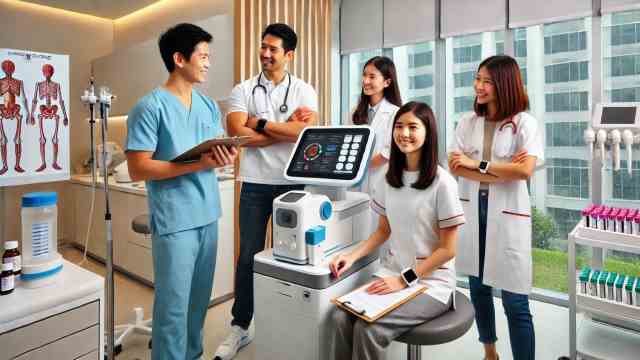How Allergy Testing in Singapore is Done
An allergy is caused when our immune system reacts overly to harmless substances that are usually harmless known as an allergen. When a person encounters an allergen, their immune system sees it as a threat and releases chemicals to combat it, causing symptoms such as sneezing, difficulty breathing, etc. Allergy testing is a crucial diagnostic tool used to identify specific allergens causing allergic reactions and aids in the treatment planning, prevention, monitoring of allergies. Allergy testing in Singapore is offered by various medical facilities. For a starting point – visit https://www.drbenmedical.sg/allergy-test-singapore/.
Allergens can be from food, the environment or other sources. Singapore has plenty of food allergens, with shellfish being the most frequent. Other common food allergens are nuts, eggs, milk, wheat, and seafood. Dust mites, pollen, mold, cockroaches and pet dander are among the environmental allergens also common in Singapore. Other allergies include galactosaccharides (GOS), which are prevalent in infant formulas and several drugs. It is crucial to note that these lists are not exhaustive, and personal sensitivities may differ.
Allergies can cause a variety of symptoms, including respiratory symptoms such as nasal congestion, runny nose, sneezing, and coughing, skin symptoms such as rash, hives, and eczema, as well as fatigue, headaches, and stomach trouble. Serious allergic reactions, such as anaphylaxis, can be fatal and necessitate emergency medical intervention.
Allergy testing in Singapore is critical for diagnosing and treating allergies because it identifies particular allergens that cause symptoms. It gives an accurate diagnosis, allowing for more individualized treatment strategies. Identifying allergies can help prevent severe reactions like anaphylaxis and enhance overall quality of life.
Here are the common Allergy testing done in Singapore to check for allergies:
- Skin Prick Tests (SPTs)
- Skin Prick Tests (SPTs) are a popular technique for detecting allergies that includes pricking the skin with a small amount of the suspected allergen. SPTs use commercial-grade allergen extracts to identify trigger allergens such as mold, pet dander, pollen, food, and dust mites. SPTs are easy, straightforward, and very effective, and are usually administered on the patient’s forearm or back. SPTs can assess allergic reactions to more than 40 substances in a single test. SPTs are rapid, painless, and typically provide instant results.
- SPTs involve cleaning the skin (sterilizing with alcohol), marking the target area for testing each allergen, applying tiny amounts (drops) of allergen via a small puncture with a skin applicator, and monitoring the reaction. SPT results are typically available 20 minutes following the test. Positive reactions are characterized by a raised, irritating bump or welt, and negative reactions are defined by no reaction. However, SPTs may not always be accurate, especially for allergies like peanuts and tree nuts.v
- Mild itching and redness in the examined body part are common and normally subside within a few minutes.
- To prepare for a Skin Prick Test (SPT), avoid antihistamines and allergy medicines for 3-5 days. Inform your doctor about any other medications you are taking, since they may require adjustments. Eat a light meal, wear loose-fitting clothing, and come on time to ensure smooth test results and minimal discomfort. These suggestions will help to ensure accurate results and reduce potential discomfort during the process.
- Blood tests for Allergens
- Blood tests are a useful method for diagnosing allergies, especially when skin prick tests are insufficient. Two common blood tests are the Radioallergosorbent Test (RAST) and ImmunoCAP. RAST uses radioactive labels attached to allergens, whereas ImmunoCAP uses Enzyme-linked immunosorbent assay (ELISA) technique. Both tests produce valid results, however ImmunoCAP is typically regarded as more sensitive and specific due to its advanced detecting mechanism.
- RAST by collecting a blood sample from a vein, combining it with certain allergens, detecting the antibodies, attaching radioactive labels to the allergens, and calculating the amount of radioactive labels linked to them. RAST is appropriate for persons with delicate skin or those taking drugs that interfere with skin testing; it can test for a wide range of allergens and may be more sensitive to delayed-type allergic reactions than skin prick tests.
- ImmunoCAP, same with RAST, works by drawing blood from a vein, combining it with certain allergens, and detecting the IgE antibodies that attach to the allergens. ImmunoCAP is extremely sensitive and specific, capable of testing for a wide range of allergens such as airborne, food, and insect venom. It may be more sensitive than skin prick tests for detecting delayed-type allergic reactions, and it is appropriate for people who have sensitive skin or are taking drugs that interfere with skin testing. However, it may be more expensive than skin prick testing
- Patch tests
- Patch tests are commonly used in Singapore to diagnose contact allergies. They entail putting small patches of possible allergens to the skin and monitoring for reactions over the following few days. Common allergies examined include nickel, perfumes, preservatives, and latex. The patches are placed on the skin for 48-72 hours before being removed and checked for any symptoms of reaction. Metals such as gold and silver are commonly tested as allergies. Important concerns include the time it takes for a reaction to manifest, the likelihood of false positives, and patch test sensitivity to specific allergens.
The cost of allergy testing in Singapore varies depending on numerous factors, including:
- Type of test to be done: Skin prick testing, blood tests (RAST or ImmunoCAP), and patch tests may all have varying costs. Skin prick tests (SPTs) are the least expensive type of allergy test while Patch tests are the most expensive.
- Number of allergens tested: Testing for more allergens typically raises the cost.
- Healthcare providers: The fees paid by clinics or hospitals may differ.
- Insurance coverage: Your health insurance may pay some or all of the cost of allergy testing.
Medical Facilities in Singapore offer various packages to check for food allergens (such as peanut, shrimp, etc.) and inhalant allergens (such as dog/cat dander, bermuda grass, etc.). Allergy testing in Singapore is offered for adults and children. It is recommended that you contact healthcare providers in Singapore to obtain precise cost estimates for allergy testing.
—
Dr Ben Medical @ Tanjong Pagar | ED Treatment | STD Treatment Singapore
SBF Center Medical Suites
160 Robinson Road
#03-09 SBF Center Medical Suites
Singapore 068914
+65 888 12344







